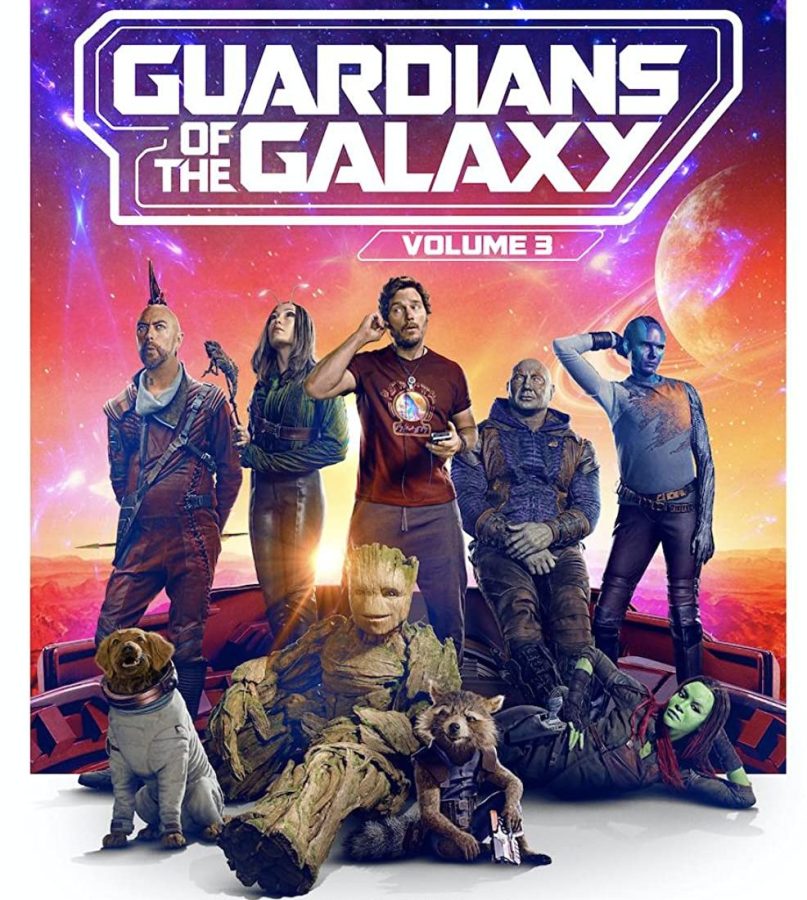“Guardians of the Galaxy Vol. 3”: A flawed finale
While “Guardians of the Galaxy Vol. 3” has its strong moments, the overall experience is flawed and not the triumphant masterpiece that so many hoped for.
May 23, 2023
![]()
Following the disappointment that was the past four years of the Marvel Cinematic Universe (MCU), it was high time for director James Gunn to deliver a gem with the third installment of the “Guardians of the Galaxy” trilogy. While the film has its strong moments, the overall experience is flawed and not the triumphant masterpiece that so many hoped for.
Despite the underwhelming nature of the movie, there are still notable redeeming qualities. Recent MCU films like “Doctor Strange in the Multiverse of Madness” have had too many competing directions and rewrites, but Gunn thankfully delivers a film with a clear vision. His hyperactive style is integral to the film, especially in the camerawork; the cinematography often features a spinning camera or gorgeous wide shots. The movie also includes several incredible action sequences, the standout being a one-take hallway fight between the Guardians and a horde of aliens.
The humor throughout the film is another highlight. Audiences are bound to enjoy a few laughs from the comedic all-star team of Pom Klementieff’s Mantis, Dave Bautista’s Drax and Karen Gillan’s Nebula. Where past films had Drax act condescending towards Mantis, this installation leans into a humorous rivalry, allowing both to banter equally. Gunn also wrote Nebula into the bossy older sister role, further allowing the comedic gold to shine.
But apart from the humor and cinematography, the rest of the movie’s drawbacks start to pile up — starting with Chris Pratt’s Peter Quill. Quill’s relationship with Zoe Saldana’s Gamora was a necessary plotline in the film, though it’s handled differently than in previous movies. Quill is upset that Gamora is now part of The Ravagers, a space pirate group. To Quill’s dismay, she now doesn’t feel inclined to help the Guardians and is constantly antagonistic towards her former friends. Gamora wasn’t always a hero in the past films, but now she holds the Guardians back from their urgent mission. Additionally, Quill can’t get over his past feelings for Gamora, which stunts his development as a leader. The script addresses the foolishness of Quill’s inability to let go, though it is too little too late. It’s clear that Gunn doesn’t know how to build off of Gamora and Quill’s past in Vol. 3.
The overall narrative doesn’t fully come together either. Marvel marketed Bradley Cooper’s Rocket Raccoon as the star of the film, but his storyline doesn’t fully compliment the emotional heights it strives to reach. Diving into his backstory is tragic and grim, yet it feels clunky. All the flashbacks were awkward — inserted into scenes they didn’t belong in — despite being integral to the story. The main plotline also sidelines Rocket with an injury, an odd choice for a film that considers him as the main protagonist. By taking Rocket out of action and then adding flashbacks that halt the adventure’s momentum to make up for it, the script is never able to hone in on his arc in the present.
The MCU has frequently received hate for generic antagonists, a criticism that is warranted in the final installment of this trilogy. Chukwudi Iwuji as The High Evolutionary is utterly despicable in his actions, such as torturing animals and committing mass genocide, but he becomes a screaming idiot by the third act. The performance is jarring, and a more subtle approach to his madness would have made his deeds more chilling. As the film progresses, the characters continue to take him less and less seriously. Without a true threat for the Guardians, the film’s climax is an underwhelming final battle devoid of tension.
Will Poulter’s Adam Warlock is incredibly weak as well. For a character that’s widely known as one of the most powerful in the Marvel canon, he is a complete afterthought. Warlock is portrayed as a glorified henchman — a role that could have been fulfilled by numerous other characters. His place in the film feels like a studio-mandated continuation of the Vol. 2 post-credits scene, not something Gunn naturally weaved into the conclusion of the trilogy.
Gunn sought to end each character on a high note, but in contrast with the hard-edged stakes of Rocket’s backstory and The High Evolutionary’s final plan, the ending is anticlimactic. It’s the logical conclusion to the Guardians trilogy, and a crowd-pleasing send-off to these characters — but crowd-pleasing isn’t always the way to go. The film ends in a similar fashion to almost every other superhero film, by letting the heroes off easy. A celebratory conclusion makes audiences smile, but a bittersweet ending would have been far more biting and memorable for viewers. The Guardians have been around for nine years and still more adventures seem to be possible, which is an odd feeling for a finale.
“Guardians of the Galaxy Vol. 3,” is composed of peaks and pitfalls. Gunn shot for the stars with the finale, but the movie’s flawed composition fell short of its expectations to be a top-tier film in the superhero genre.












Christian Rommer • May 24, 2023 at 10:20 pm
Great work!
Marcus Bowers • May 24, 2023 at 6:02 pm
Loved the insight and analysis of the plot line! I also enjoy that each character’s role in the film is outlined by you!
Elola Eckford • May 24, 2023 at 12:29 pm
Awesome first review here Ryland this was a great read!! Loved the analysis